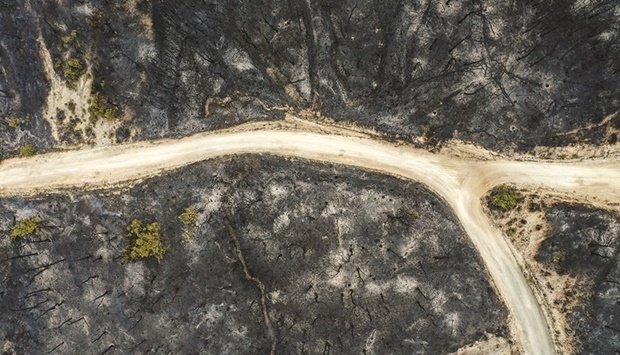Greek firefighters battled wildfires on three fronts yesterday as flames destroyed around 2,200 hectares of woodland in one of the country’s most important protected habitats.
Around 320 firefighters, two water-bombing planes and four helicopters deployed to contain the fire, now raging for a fourth day, at the Dadia National Park, known for its black vulture colony.
Some villages in the area have been evacuated. The flames have already destroyed some 2,200 hectares of woodland, according to a local mayor.
“It’s an uphill battle, a fight to ensure the survival of this exceptional ecosystem,” said the minister for climate crisis and civil protection, Christos Stylianidis, after visiting the affected area.
“It’s an ecological disaster, the damage is incalculable,” Soufli mayor Panagiotis Kalakikos told Star TV.
Dadia, around 900km, northeast of Athens, calls itself one of the most important protected areas in Europe, offering ideal habitat for rare birds and says it is home to the only breeding population of black vultures in the Balkans.
Greece is particularly vulnerable to fires during the summer season. Wildfires last year destroyed 103,000 hectares and claimed three lives, driven by drought and a warming climate.
Scientists say human-induced climate change is amplifying extreme weather events — including heatwaves, droughts and fires seen in several parts of Europe and California in recent weeks — and say these events will become more frequent and more intense.
More than 140 fires have broken out in Greece in the last 24 hours according to the country’s fire service. Last week saw temperatures of up to 42 degrees Celsius in parts of the country, although temperatures dipped slightly yesterday.
The civil protection agency said, however, that the risk of forest fires remained high given the temperatures and strong winds.
“Experts must look into redressing the problems sparked by the fire,” said Stylianidis, underscoring the need to buttress the “resistance of the ecosystem in the future”.
Dadia hosts three out of the four vulture species of Europe — the black vulture, the griffon vulture and the Egyptian vulture — and 36 of Europe’s 38 species of raptors.
Its varied habitats also support 104 butterfly species, 13 amphibian species, 29 reptile species and about 65 mammal species, 24 out of which are bats.
Fires have raged in the north, east and south of Greece, including on the tourist island of Lesbos, where around 200 people were ordered to leave the village of Vrisa on Sunday to escape the flames.
For fires in the southern Peloponnese peninsula, Citizens’ Protection Minister Takis Theodorikakos said arson was at least one factor in causing the blazes.
A major fire continued to burn yesterday in Krestena, in the west of the peninsula.
“It’s evident that arson is involved,” Theodorikakos said, adding that 15 fires had broken out in 20 days alone in the Peloponnese prefecture of Elis, home to Olympia, the birthplace of the ancient Olympic Games.

Charred trees are seen as a wildfire burns in the Dadia National Park, in the region of Evros, Greece, yesterday. (Reuters)
